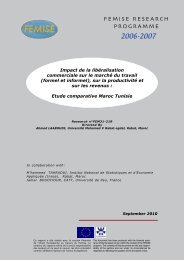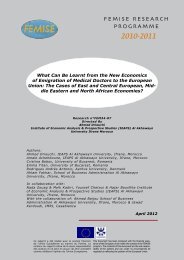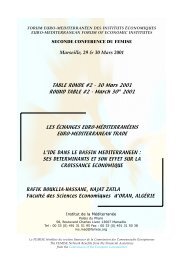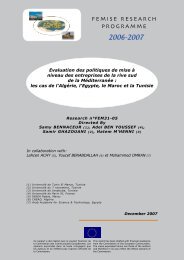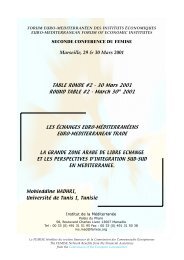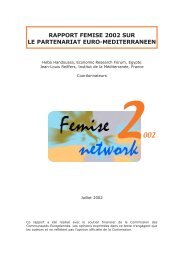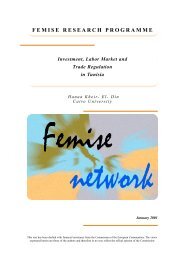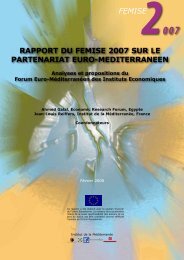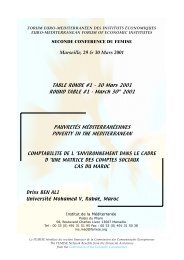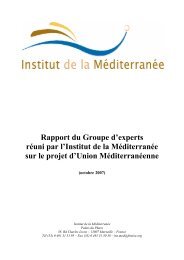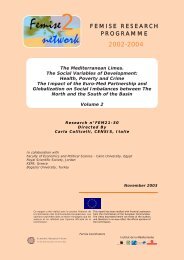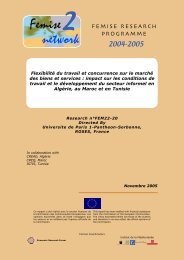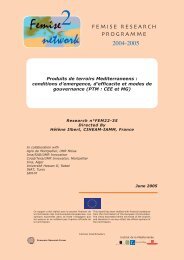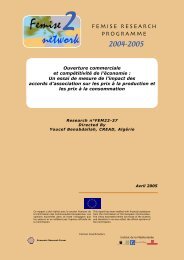PDF, GB, 56 p., 1,3 Mo - Femise
PDF, GB, 56 p., 1,3 Mo - Femise
PDF, GB, 56 p., 1,3 Mo - Femise
Create successful ePaper yourself
Turn your PDF publications into a flip-book with our unique Google optimized e-Paper software.
5 Appendix 1: Qualifying Industrial Zones<br />
Egypt signed a Qualifying Industrial Zones (QIZ) protocol with the US and Israel in<br />
December 2004, to avoid the negative impact of the expiration of the ATC quotas and<br />
the threat it poses on the textile and clothing industry in Egypt. This signing came as a<br />
response to demands by producers and workers in the textile industry, which is<br />
considered one of the oldest industries in Egypt. Its assets are estimated to be 15<br />
billion Egyptian pounds, it employees reach almost 1 million and its exports<br />
constitute almost 30 percent of manufactured exports.<br />
QIZ are geographically designated areas in Egypt determined by the Egyptian<br />
government and approved by the US government where industrial products originated<br />
in Egypt and satisfying agreed-upon Israeli content are granted free entry into the U.S.<br />
customs territories.<br />
Products must meet the value content requirements of 35 percent, where the sum of<br />
materials and direct costs of processing in QIZ and Israel must exceed 35 percent of<br />
the finished product’s value (ex. factory price). QIZ factories and Israeli side each<br />
contribute and maintain at least one third (11.7 percent) of the minimum 35 percent of<br />
local content required, on a quarterly basis. Products must be exported to the US<br />
directly from QIZ.<br />
Advantages of QIZ:<br />
Duty free access to the US Market: This preferential treatment entails free access to<br />
all Egyptian products manufactured in QIZ to the US market without tariff or nontariff<br />
barriers, as long as these products comply with ROO requirements.<br />
Simple requirements to benefit from the free access: The required rules state that<br />
35 percent of the commodity's value must be manufactured in an Egyptian QIZ, of<br />
which a minimum of 11.7 percent Israeli inputs. Although, it should be noted that a<br />
number of exporters are complaining from the increase in the prices of Israeli’s inputs<br />
and are asking to reduce the 11.7 percent Israeli content to the 7 percent applied in<br />
Jordan.<br />
Flexible application of the requirements: The protocol has established flexible rules<br />
such that the Israeli content is not revised for every single shipment of exports to the<br />
USA, provided that this factory's cumulative exports every quarter satisfy the agreed<br />
upon ratio.<br />
No quotas on exported products: The free access of the products is not limited by<br />
any quotas on quantities nor seasons.<br />
Open ended validity of the protocol: As can be seen from reading the actual<br />
protocol, it is not timed and has no preset end date.<br />
The Geographic coverage area of QIZ includes some zones of Greater Cairo,<br />
Alexandria, Suez Canal area and four Middle Delta governorates. Industries that can<br />
benefit from QIZ include Textile/Apparel, food and beverage, leather products,<br />
footwear and glassware.



